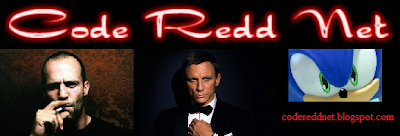Much like TimeSplitters 2, which we only got around to reviewing a few months ago, NBA Street Vol. 2 is another one of those games that we've somehow neglected, even though we have such fond memories of it. Since Chicken Man already gave us the word on the inferior sequel, NBA Street V3, it's time this nominee for our Best Sports Game award got some shine.
It's not just NBA Jam with chain nets and rusty backboards: NBA Street Vol. 2 is what the best of Tony Hawk's Pro Skater can do for arcade-style basketball games. By that I mean the trick system of Vol. 2, which includes (but is certainly not limited to) stylish crossovers and dunks, puts its emphasis on the combo potential of any situation: use any of the four turbo buttons to fake out the defender by dribbling between his legs and finish by passing the ball off the backboard to a skyward teammate for the slam, for example. The more moves you combo up, the quicker you can launch one of those all-important Gamebreakers, supermoves that embarrass your opponent as well as significantly altering the score of the game. At times these Gamebreakers can more than live up to their name: too often the point-swing induced by a successful Gamebreaker can virtually eliminate any chance for the opposing team to win the game (subtracting, say two points from them and throwing four your way), and this is especially troublesome considering that for even moderately talented players Gamebreakers are quite easy to attain. It's not enough to hurt the game, but it can make it way to easy when playing against the CPU as opposed to human players.
Nevertheless, the genius of this combo system is that every offensive or defensive move can be linked together for maximum points: a rebound, pass off the head, crossover, and three-pointer performed uninterrupted earn more points towards that Gamebreaker than when they are performed separately. Though it's obvious from playing Vol. 2 for even a few minutes that this is an offensive-minded game, the balance struck between offensive flash and defensive toughness is strong. Blocking in an especially useful technique, and learning the art of the block is essential to getting wins on the harder difficulty settings. Steals have also been substantially upgraded from the original: whereas defenders were relatively helpless to stop a point guard's ankle breakers before (not unlike the And 1 mixtapes of lore*), in Vol. 2 the same combo system that enables those tricky tricks can be utilized by the defense to stop them cold. Balanced in this sense, Vol. 2 is real smooth, effortless to play, and continually rewarding in repetition.
Speaking of legends, Vol. 2 has all of 'em: Wilt Chamberlain, Pistol Pete Maravich, Elgin Baylor, three Michael Jordans, Larry Bird, Magic Johnson, Dr. J, and so on. It's an extensive roster pieced together from league history. Strangely enough, Vol. 2 brings back many of the "street legends" from NBA Street, even those that were clearly meant to be stand-ins for real life players: for instance, Dr. J wannabee Stretch returns, though, thankfully, the fake Yao Ming boss from the first game did not make the cut. For the most part, I don't mind the inclusion of these fictional characters (except for Biggie Little, who's annoying), but they seem an odd fit in a game so preoccupied with real legends.
And though the first Vol. 1 was pretty bland in terms of presentation, Vol. 2 has style in spades. Not only do the courts and the players look fantastic (though their movements are somewhat stiff and ugly), but the music is much better this time around, generally sticking with non-lyrical beats during the games. Unfortunately, this means that all the words come from the mouth of announcer Bobbito Garcia, an infuriating personality that may, and I do mean may, have been tolerable 10 years ago. His particular word-vomit salad includes bad singing, bad punning, and rambling, nonsensical challenges whenever you have a shot rejected. His voice is one of the last things you want to hear when Shaq knocks you down in the paint. Thankfully, though, he can be turned off. Vol. 2, however, cannot: take Bobbito out of the mix and you have one of the PS2's finest basketball games.




